Overcoming Bias
Overcoming Bias
Copyright 2016 by Tiffany Jana and Matthew Freeman
All rights reserved. No part of this publication may be reproduced, distributed, or transmitted in any form or by any means, including photocopying, recording, or other electronic or mechanical methods, without the prior written permission of the publisher, except in the case of brief quotations embodied in critical reviews and certain other noncommercial uses permitted by copyright law. For permission requests, write to the publisher, addressed Attention: Permissions Coordinator, at the address below.
 Berrett-Koehler Publishers, Inc.
Berrett-Koehler Publishers, Inc.
1333 Broadway, Suite 1000
Oakland, CA 94612-1921
Tel: (510) 817-2277, Fax: (510) 817-2278
www.bkconnection.com
Ordering information for print editions
Quantity sales. Special discounts are available on quantity purchases by corporations, associations, and others. For details, contact the Special Sales Department at the Berrett-Koehler address above.
Individual sales. Berrett-Koehler publications are available through most bookstores. They can also be ordered directly from Berrett-Koehler: Tel: (800) 929-2929; Fax: (802) 864-7626; www.bkconnection.com
Orders for college textbook/course adoption use. Please contact Berrett-Koehler: Tel: (800) 929-2929; Fax: (802) 864-7626.
Orders by U.S. trade bookstores and wholesalers. Please contact Ingram Publisher Services, Tel: (800) 509-4887; Fax: (800) 838-1149; E-mail: /Ordering for details about electronic ordering.
Berrett-Koehler and the BK logo are registered trademarks of Berrett-Koehler Publishers, Inc.
First Edition
Paperback print edition ISBN 978-1-62656-725-2
PDF e-book ISBN 978-1-62656-726-9
IDPF e-book ISBN 978-1-62656-727-6
2016-1
Interior design and production: Dovetail Publishing Services
Cover designer: Dan Tesser / Studio Carnelian
Overcoming Bias
Building authentic relationships across differences
Tiffany Jana  Matthew Freeman
Matthew Freeman

To our parents, without whom we may have been too biased to fall in love across differences.
Contents
Preface
Overcoming bias: building authentic relationships across differences is about our human tendency to prefer some things and people more than others, and how to be intentional about not mistrusting people who are different from us. Bias, simply put, is the preference for one thing over another. Preferring warm weather over cold weather is a bias. Bias is a survival instinct that helps the human brain make rapid choices in a world where we are bombarded by thousands of choices every day. The problem with bias is that it doesnt stop at weather; it extends to rapid choices about which groups of people we instinctively trust and which we mistrust or fear.
We use the word differences in the title and throughout the book because without differences there would be no bias, particularly toward or against people. Its easy to get along with people who are like us. When people share similar values, perspectives, and experiences, we can relate to them. Whats challenging is when we want or need to build relationships with people from different walks of life.
Differences can be about anything from educational background to age. Differences also include such hotly politicized topics as race, religion, and immigration status. Differences are not limited to any of these areas and can include anything that is different from you, the reader. Those are the only differences that matter as you use this book, because they are the ones that will challenge you. And yes, this is a book you use. You dont just read it. The book includes exercises and activities designed to help you navigate bias and increase your fluency on the subject.
If we do not choose to overcome our biases, we can inadvertently harm relationships and alienate people with our thoughtless autopilot responses. And collectively, these individual biases create disparate outcomes in our institutions, from education to health care to workplaces. Most often, we harbor biases that we have simply failed to reconsider as we have matured and gained more experience. We can consciously hold one set of beliefs while we unconsciously hold onto misguided ideas we encountered in our youth but never reexamined. This book will help you or someone you know clean out those cobwebs and build stronger, more authentic relationshipsacross difference.
We wrote this book because we work in management consulting, where we are constantly faced with challenges that emerge as a result of unchecked bias. We see everything from employees who feel unheard and undervalued to those who feel their only recourse is to file discrimination or harassment lawsuits.
We wrote this for individuals who want to take control of the bias conversation, understand it better, and take action to help themselves or the people around them. There is no need to wait until employees become disengaged or, worse, until someone sues you or your company. On a personal level, you dont have to stand idly by and let your trusted friend or your crazy uncle say biased things that you know cause harm to others. The information in this book can provide you with the skills you, your friends and family, or your teams need to work together and relate to each other with respect and compassion. Our goal is to provide you with everything you need to understand bias, talk about it with increased fluency, and overcome it so you can build stronger relationships in your personal and professional lives.
Introduction
Why is everybody biased but me?
Have you noticed a lot of conversations, articles, and news coverage about bias? Have you questioned yourself and wondered whether you have bias or noticed places where you experience your own bias or someone elses? Are you looking for ways to recognize whether bias is getting in the way of your relationships or your success in the workplace? If so, we can help. Human bias is a fact of life. It is an annoying and frustrating part of life, but we have all been in situations where we see it and think, Oh no. This is not really happening. How could he think that what he is saying is OK? Or worse, Why did I just say that? Most of us are paralyzed in those situations, not because we are bad people, but often because we dont want to make a bad situation worse.
In this book we discuss why bias matters, we define the terms we believe will increase your fluency on the subject, and we talk about how you can move from thinking about bias to taking meaningful action to overcome it. Bias matters because we all have it and if you leave it unchecked, it can cause you to inadvertently push people away. This is precisely why we talk about building authentic relationships across differences. This book provides the tools you need to build and strengthen relationships without your unconscious biases getting in the way. You will find exercises, games, and activities to help you connect to your thought patterns and become more proactive and less reactive.
So what exactly do we mean when we say overcoming bias? By overcoming, we mean to control, conquer, and prevail over your bias. We have already stated and will continue to state that bias is not is very useful.
Next page

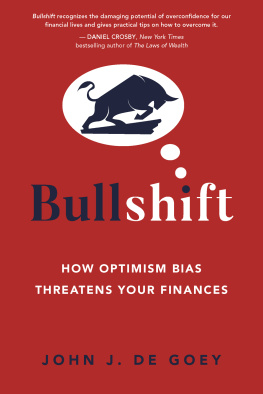
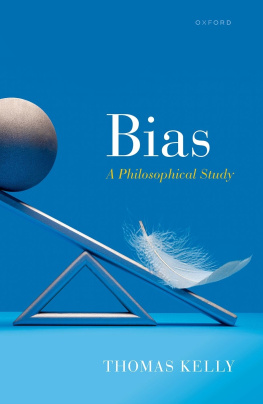
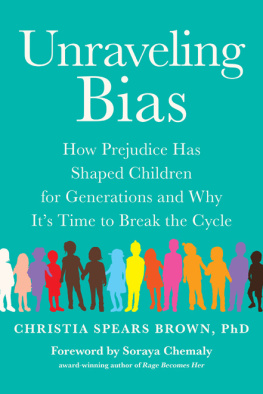
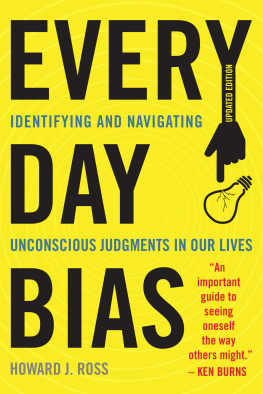
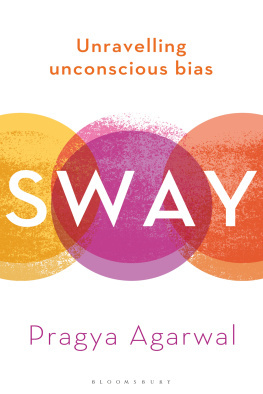
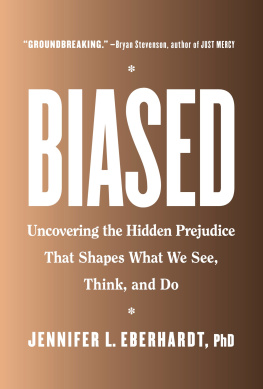
 Berrett-Koehler Publishers, Inc.
Berrett-Koehler Publishers, Inc. Matthew Freeman
Matthew Freeman